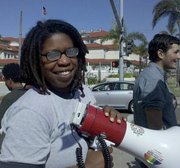The Fight for LGBT Liberation
(This is the first in a series of article of the next few days while we attend the Socialism 2011 Conference in Chicago.)
The first session we attended was on the issue of LGBT Liberation that was led by Zakiya Khabir, an organizer from California. Zakiya began by mentioning recent victories, particularly the New York Marriage equality vote. She also mentions that more countries have adopted LGBT friendly policies and acknowledges the increase of gay and lesbian characters on US TV programming (although not bisexual or trans characters).
However, Zakiya states that there are still huge barriers and even an increase in attacks against the LGBT community, as was reported in a Southern Poverty Law Center report last year. In addition, there are current efforts to repeal LGBT rights ordinances and an increase in violence against gay communities around the world, as is evidenced in Uganda recently. Having said that Zakiya notes that the view that the “western world” is more tolerant is not really true.
The presenter then provides a brief overview about how cultures throughout history have embraced same sex relationships, especially Indigenous cultures. The notion of gender and sexuality constructs was a more recent reflection of humanity, according to Zakiya, who stated that older cultures did not have these kinds of strict designations for men and women.
Zakiya also spends some time talking about the rise of monogamous marriage, particularly within European culture, which also spread due to European colonialism. Monogamy not only became the heterosexual norm for relationships, it spread around the world because of the European colonialism. As Europeans imposed their own cultural norms on much of the rest of the world, non-monogamous relationships became suspect and even criminalized. The presenter also points out that the rise and growth of capitalism also contributed to the growth of homophobia, since Capitalism also changed gender roles through industrialization.
Zakiya then asks what does this issue mean for socialists and those who are committed to social justice? She mentions that there are roots of socialism and anarchism that have embraced and advocated not only for LGBT rights, but for the state to stay out the sexual lives of people. This was clearly one of the messages of people like Emma Goldman.
The presenter then shifts her comments to the issue of Marriage Equality as a manifestation of LGBT Liberation. She says that the battle could take the form of either a state by state battle or the repeal of the 1996 law passed under Clinton known as DOMA, the Defense of Marriage Act.
Zakiya points out that you can still get fired from jobs in 29 states because of your sexual orientation. The reality is even worse for people who identify as Trans, according to the presenter.
A different strategy that is advocated for is to support candidates and particularly President Obama. Zakiya criticizes the Human Rights Campaign and their call for people to support the Obama’s re-election and other Marriage Equality candidates – all five of them. This criticism was also seen at a recent fundraiser for Obama where Gay rights activists were protesting.
Zakiya also mentions that LGBT rights need to be woven into other struggles and cites the recent SlutWalks that have generally included information about violence against Trans people. There is also evidence of more collaboration within both the labor and immigration movements.
The rest of the session was spent with questions and comments from those in attendance. Several people addressed issues around the lack of adequate health care for the LGBTQ community as well as efforts around the country to criminalize the LGBTQ community.
However, most of the conversation was centered around the need to shift the movement’s strategy from marriage equality to a more radical critique that involves direct action. One way to do this would be to connect the fight against austerity to LGBT issues. Several people emphasized how budget cuts have to be part of LGBT struggles, since they disproportionately impact the LGBT community.
Another participant made the point that there seem to be a fair amount of folks in the LGBT community who are more interested in just assimilating themselves into the dominant culture as opposed to participating in broader liberation struggles. This comment led others to acknowledge that many of the national LGBT organizations tend to affirm this emphasis on assimilation. Several people said we can’t wait for Obama to make changes for us, we need to do it on our own. Another person said, “Lets not spend our money on elections, but on building a movement!”
As an example of how assimilation is manifested, was with the national groups like GLAAD, the Gay & Lesbian Alliance Against Defamation. This weekend the president of GLAAD along with several board members resigned because of conflict of interest where GLAAD issued a statement supporting AT&T and T-Mobile’s merger plans. AT&T is a major financial contributor GLAAD and other national LGBT organizations. This underscores the need for a more radical movement that understands the Gay Liberation history and does not advocate for assimilation.
In response to this, one person states that we should not have fights between what writer Sherry Wolf calls “Gay Inc.” groups and the movement. We should hold them accountable, but put energy on the issues. Another person also agreed that we shouldn’t fight these groups, but we need to take our own positions and make our own statements and create our own strategies that are more radical than the Gay Inc. groups.

